Share
Working at ESO
Are you interested in working in areas of frontline technology and in a stimulating international environment? Do you feel your profile matches our requirements? Learn more about our current vacancies and apply online. Read more..
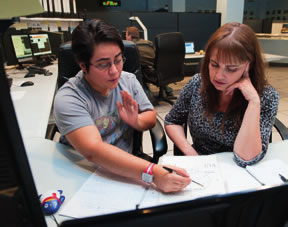
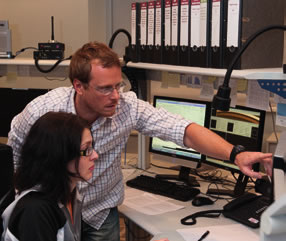

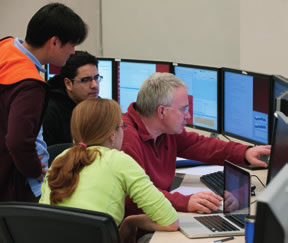
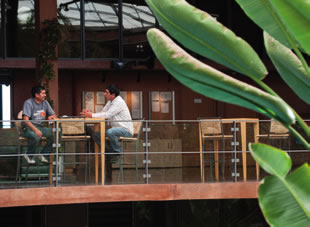
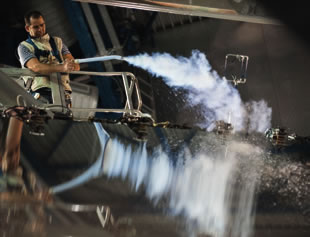
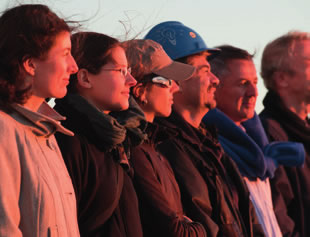
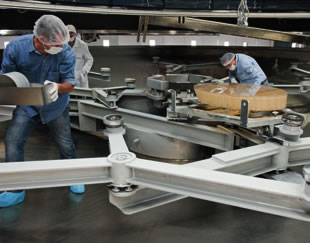
The European Organisation for Astronomical Research in the Southern Hemisphere (ESO) is the foremost intergovernmental astronomy organisation in Europe and the world's most productive ground-based astronomical observatory. ESO carries out an ambitious programme focused on the design, construction and operation of powerful ground-based observing facilities enabling astronomers to make important scientific discoveries. ESO operates three unique world-class observing sites in northern Chile: La Silla, Paranal and Chajnantor (home to ALMA), and the ESO Headquarters are located in Garching, near Munich, Germany. At Paranal, ESO operates the Very Large Telescope, the world's most advanced visible-light astronomical observatory, and will host and operate the southern array of the Cherenkov Telescope Array, the world's largest and most sensitive high energy gamma-ray observatory. ESO is a major partner in ALMA. On Cerro Armazones, ESO is building the 39-metre Extremely Large Telescope (ELT), which will become "the world's biggest eye on the sky" and whose operations will be fully integrated into the Paranal Observatory.
Within its Maintenance, Support and Engineering Department (MSE) at the La Silla Paranal Observatory, within the Directorate of Operations, ESO is advertising the position of
Instrumentation Engineer
Paranal
Deadline 09/07/2023
The successful applicant will be Instrumentation Engineer in the Instrumentation Group within the MSE Department at the Paranal site of the La Silla Paranal Observatory. The MSE Department, with a workforce of 85 engineers and technicians, provides maintenance and technical support to the four 8m VLT telescopes, to the VLT Interferometer with its auxiliary telescopes, the VST and VISTA survey telescopes and to all instruments available for scientific observations. The Instrumentation Group is comprised of 15 engineers and technicians and is responsible for all astronomical instruments at the Paranal Observatory. The group Is responsible for "Maintien en Condition Operationelle" (MCO) of all (HW only) instruments (including MACAO + VLTI Instruments + 4LGSF + MMU), MCO of detector and opto-mechanical labs, MCO of technical equipment in New Integration Hall, Clean room for Interface and follow-up for new instruments (HW), WP management of outsourced contract.
Main Duties and Responsibilities:
The selected candidate will have the following main duties:
As Instrumentation Engineer:
- Have the technical responsibility of one or more systems:
- Be responsible of all maintenance activities (corrective and planned) and obsolescence analysis.
- Ensure the availability of the systems according to specification.
- Propose and implement change requests (analysis, design, implementation, commissioning, documentation)
- Interact with the optical engineers at ESO headquarters and with the Support and Quality Assurance group (planning, spare parts, maintenance plan optimization, documentation, and quality control)
Support activities:
- Execute performance analysis when needed.
- Assembly Integration and Verification of new systems and ensure the transfer of knowledge from project to the dedicated team.
- Any critical Paranal observatory activities for which your competencies are requested by your manager.
Reports to:
The Group Leader of the Instrumentation Group.
Experience:
The candidate has ideally three years of professional experience in one or more of these areas:
- The field of astronomical or scientific instrument mechanical maintenance or development (design, analysis and/or verification, including thermoelastic analysis) by using a variety of engineering tools and standard methodologies
- Development or maintenance of cryo-mechanism, particularly lifetime verification for astronomical or space applications
- Development or maintenance of Cryogenic and vacuum systems of astronomical or scientific instrumentation or space systems
- The field of astronomical or scientific instrument detector and associated Front End Electronics (FEE) maintenance or development (design, analysis and/or characterization) by using a variety of engineering tools and standard methodologies.
- Experience with advanced maintenance and reliability methodologies, and Industry 4.0 technologies is desirable.
Knowledge and experience in at least two of the following domains will be an asset:
- System engineering
- Cryogenic and vacuum systems
- Mechanism in cryo-vacuum conditions
- Optical instrumentation mechanical design and analysis
- Astronomical Detectors and associated Front End Electronics (FEE).
Key Competences:
The candidate has ideally several of the following competences (technical and soft):
- Ability to understand the 'big picture' and the details of complex systems, their interfaces, and their performance.
- Ability to trouble shoot and solve problems under difficult working conditions and with tight deadlines.
- Real interest to learn maintenance and trouble-shooting techniques.
- Having a fine grasp of practical work, in particular for mechanical support to optical alignment.
- Strong sense of team spirit with the ability to work effectively in a multi-national and multi-cultural environment.
- Good self-organization.
- Constructively suggest improvements to work processes.
- Plan effectively and monitor progress of work, deliver results on time and to standards.
Qualifications:
University degree in physics, engineering or astronomy. Specialisation in the field of astronomical instrumentation and/or system engineering, or equivalent.
Language Skills:
ESO is an international organization where the official language is English. It is required that the candidate has a good command of written and spoken English.
Remuneration and Contract:
We offer an attractive remuneration package including a competitive salary and educational benefits, as well as financial help in relocating the candidate's family, where applicable. ESO aims to support members of personnel in maintaining a good work-life balance.
The initial contract is for a period of two years with the possibility of indefinite extension, subject to evaluation.The title or grade may be subject to change according to qualification and the number of years of experience.
For further information, please visit https://www.eso.org/public/archives/static/jobs/conditions/brochure-lsm-updated-jan2020.pdf
Duty Station:
Paranal Observatory located 120 km south of the city of Antofagasta, Chile. The working schedule will be 8 days on duty and 6 days off duty (8x6) with accommodation provided on site.
Career Path:
V
Application:
If you are interested in working in areas of frontline science and technology and in a stimulating international environment, please visit http://www.eso.org for further details.
Applicants are invited to apply online at https://recruitment.eso.org/. Applications must be completed in English and should include a motivation letter and CV. Please note that the interviews will be conducted in English.
Nationality:
No nationality is in principle excluded from employment at ESO, however, non-Chilean applicants to this role must reside in Chile and/or have a pertinent working permit, according to Chilean regulations, at the time of their application.
ESO is committed to equal opportunities. The post is equally open to suitably qualified candidates irrespective of gender, age, disability, sexual orientation, ethnicity or religion.
Closing date for applications is 23 June 2023.
Interviews are expected to start soon after this date.
ESO Values:
An important element in any successful employment relationship is harmony in values between an organisation and its people.
The ESO values are:
ESO strives for excellence through innovation.
ESO provides outstanding services to its communities.
ESO fosters diversity & inclusion.
ESO believes in the key role of sustainability for its future.
Achieving the above are recognized as only possible on the basis of personal values and attitudes that we expect from our employees: respect, integrity, accountability, commitment, collaboration, and clear & open communication. Applicants to any ESO role are asked to reflect on their affinity with these values and advised they may be asked about them if called for interview.
Diversity:
ESO has established diversity as an important value of the Organisation, is committed to providing an equal opportunities environment and is actively seeking to promote a diverse, equitable and inclusive workforce. Please visit https://www.eso.org/public/about-eso/sustainability/dei-at-eso/ for further details.
